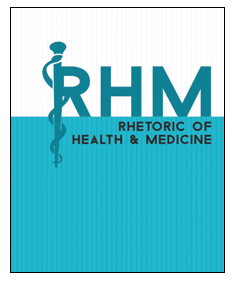Welcome to the open-access repository site for the journal Rhetoric of Health & Medicine (RHM). Here you will find various featured digital content (e.g., research videos, multimedia reviews, searchable bibliography) as well as other open access content that appears in journal issues. All of this material is also available on the journal’s main website. This repository site will help improve the access and searchability of select journal content, and will provide the journal and its published authors additional tools for tracking the reach and impact of this content.
To access full current and past issues, learn about author guidelines and submit and article, and subscribe to the journal, go the journal’s main website. RHM seeks to bring together humanities and social scientific research traditions in a rhetorically focused journal to allow scholars to build new interdisciplinary theories, methodologies, and insights that can impact our understanding of health, illness, healing, and wellness.
Featured Content
Review of Kelly Pender's Being at Genetic Risk: Toward a Rhetoric of Care
Jillian K. Zwilling
RHM Author Interview (Youtube video): Cassandra (Casi) Kearney, Ph.D., author of “Mass Shootings and Mental Health: A Historical Perspective on the ‘Mental Illness as Motive’ Narrative”
Cathryn Molloy and Erin Trauth
Teaching and Researching with a Mental Health Diagnosis: Practices and Perspectives on Academic Ableism
Ann Green, Alyssa _, Lucia Dura, Patrick Harris, Leah Heilig, Bailey Kirby, Jay McClintick, Emily Pfender, and Rebecca Carrasco
RHM Author Interview: Liz Angeli, Ph.D. and Christina Norwood, M.S., authors of Persuasion Brief: The Internal Rhetorical Work of a Public Health Crisis Response
Cathryn Molloy and Erin Trauth
Book review: Rhetorical work in emergency medical services: Communicating in the unpredictable workplace
Marissa McKinley
Book review: Bounding biomedicine: Evidence and rhetoric in the new science of alternative medicine
Blake Scott
RHM Editor Blake Scott's Interview with Lisa Keränen
Blake Scott and Lisa Keranen
RHM Author Interview: Dr. Lisa Meloncon, RHM Editor, interviews Dr. Abby Dubisar and Sara Davis on their persuasion brief, “Communicating Elective Sterilization: A Feminist Perspective”
Lisa Meloncon, Erin Trauth, and Cathryn Molloy
Assistant Editors' Interview with Dr. David Gruber and Dr. Jason Kalin
Cathryn Molloy and Erin Trauth
Assistant Editors' Interview with Dr. Colleen Derkatch
Ellie Browning
Assistant Editors' Interview with Dr. Berkeley Franz and Dr. Dan Skinner
Cathryn Molloy and Erin Trauth
An Interview with Dr. J. Fred Reynolds—Preview to his Essay “A Short History of Mental Health Rhetoric Research (MHRR)”
Fred Reynolds and Cathryn Molloy
Assistant Editors' Interview with Dr. Lisa DeTora of Hofstra University
Erin Trauth and Lisa M. DeTora
Assistant Editors' Interview with Dr. Heidi Lawrence of George Mason University
Heidi Lawrence and Cathryn Molloy


